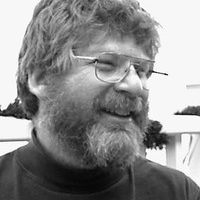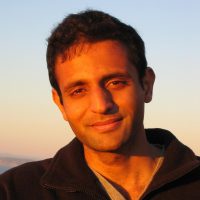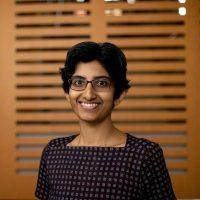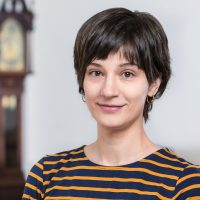TEAM

UCSD
Barna Saha is the E Guber Endowed Chair Associate Professor of UCSD CSE and HDSI. Before joining UCSD, she was an Associate Professor at UC Berkeley. Saha’s primary research focus is on Theoretical Computer Science, specifically Algorithm Design. She is passionate about diversity and teaching, and seeing students succeed from all backgrounds. She is a recipient of the Presidential Early Career Award (PECASE)- the highest honor given by the White House to early career scientists, a Sloan fellowship, an NSF CAREER Award, and multiple paper awards. Learn More.

University of Sydney
I am a Lecturer in the School of Computer Science of the University of Sydney. Prior to that, I was a postdoc first in the Stanford Theory Group, then at IBM Research Almaden. Even prior to that, I obtained my Ph.D. from the Computer Science department of Columbia University, where I was advised by Prof. Rocco Servedio. Long ago, in a distant land, I received a M.Sc. in Computer Science from the Parisian Master of Research in Computer Science, and an engineering degree from one of France’s “Grand Schools,” the École Centrale Paris. Learn More.

UCSD
Kamalika Chaudhuri is a machine learning researcher. She is interested in the foundations of trustworthy machine learning — such as robust machine learning, learning with privacy and out-of-distribution generalization. She received her Ph.D. from University of California Berkeley. Learn More.

UT Austin
Shuchi Chawla holds an Endowed Professorship in Computer Science at UT-Austin and is an Amazon Scholar. Shuchi is a theoretical computer scientist specializing in the areas of algorithm design, and economics and computation. Shuchi received a Ph.D. from Carnegie Mellon University and a B.Tech. from IIT, Delhi. Prior to joining UT-Austin, she spent 15 years as a professor of CS at the University of Wisconsin-Madison. She has also previously held visiting positions at the University of Washington and Microsoft Research. Shuchi recently served as the PC Chair of SODA’20 and EC’21, and currently serves on the editorial boards of the ACM Transactions on Algorithms and the ACM Transactions on Economics and Computation. Learn More.

UCSD
Sanjoy Dasgupta is a Professor in the Department of Computer Science and Engineering at UC San Diego. He received his PhD from Berkeley in 2000, and spent two years at AT&T Research Labs before joining UCSD. His area of research is algorithmic statistics, with a focus on unsupervised and minimally supervised learning. Learn More.

UCLA
Allie Fletcher is an Assistant Professor of UCLA Statistics Department. Previously, she was an assistant professor of UC Santa Cruz Professor. She was awarded the NSF CAREER award in January, 2013. She was previously a UC President’s Postdoctoral Fellow, a Henry Luce Foundation Claire Boothe Luce Fellow and won the UC Berkeley EECS Eugene Lawler award. She received the Ph.D. and M.S. degrees in electrical engineering, and the M.S. degree in mathematics, all from the University of California, Berkeley. She obtained the B.S. degree in mathematics and physics from the University of Iowa. Her research interests include Bayesian estimation, statistical signal processing, machine learning, and information theory with a particular interest in inference problems in neuroscience and computational models of the brain. Learn More.

Upenn
Dr. Rajiv Gandhi is an Associate Professor of Computer Science at the Rutgers University-Camden. He also teaches pat-time at the University of Pennsylvania. He received his Ph.D. in Computer Science in 2003 from the University of Maryland, College Park. His research interests lie in the broad area of theoretical computer science. Specifically, he is interested in approximation and randomized algorithms. He is a passionate educator who loves working with students with diverse backgrounds, helping them achieve their potential. He has been the recipient of several teaching excellence awards, including the Warren I. Susman award for teaching excellence at Rutgers University in 2014. He also received the Chancellor’s award for Civic Engagement at Rutgers-Camden in 2013. In 2017 he was inducted in the Computer Science Alumni Hall of Fame at the University of Maryland. He was a Fulbright Fellow from Jan-June 2011, during which he worked with students in Mumbai, India. Since 2009, he has also been working with high school students as part of the Program in Algorithmic and Combinatorial Thinking (http://algorithmicthinking.org). Learn More.

Syracuse University
Venkata Gandikota is senior personnel of EnCORE and an Assistant Professor in the Department of Electrical Engineering and Computer Science at Syracuse University.
Previously, he was a TRIPODS (Institute for Theoretical Foundations of Data Science) postdoctoral researcher at the University of Massachusetts at Amherst where he worked with Prof. Arya Mazumdar, and a postdoctoral fellow at Johns Hopkins University with Prof. Xin Li.
He received his Ph.D. in Computer Science from Purdue University under the supervision of Prof. Elena Grigorescu.
He works on the foundations of data science and machine learning. In the past, he has thoroughly enjoyed working on some classical problems in lattices and error-correcting codes. Learn More.

UCSD
Fan Chung Graham (professional name: Fan Chung , Chinese name ) is a Distinguished Professor of Mathematics and Computer Science at UC San Diego. She holds the Paul Erdos Chair in Combinatorics. She paints watercolors, especially in seascape and portraits (click the Erdös’ painting below). A good part of her work in mathematics was told in the AMS Notics article The mathematical life of Fan Chung by Steve Butler. Learn More.
) is a Distinguished Professor of Mathematics and Computer Science at UC San Diego. She holds the Paul Erdos Chair in Combinatorics. She paints watercolors, especially in seascape and portraits (click the Erdös’ painting below). A good part of her work in mathematics was told in the AMS Notics article The mathematical life of Fan Chung by Steve Butler. Learn More.

Santa Clara University
Mustafa Hajij is senior personnel of EnCORE and assistant professor of data science at the department of mathematics and computer science SCU. His research interests include Topological and Geometric Deep Learning, Topological Data Analysis, and Geometric Data Processing. Learn More.

Purdue
Abolfazl Hashemi is senior personnel of EnCORE and Assistant Professor at The Elmore Family School of Electrical and Computer Engineering at Purdue University and the director of MINDS Group. Previously, he was a Postdoctoral scholar at the Oden Institute for Computational Engineering and Sciences at the University of Texas at Austin. He received his PhD and MSE degrees in Electrical and Computer Engineering department at UT Austin in 2020 and 2016, and his BS degree in Electrical Engineering from Sharif University of Technology in 2014. Learn More.

UPenn
Hamed Hassani is an assistant professor in the Department of Electrical and Systems Engineering , and holds a secondary appointments in the Department of Computer and Information Systems as well as the Department of Statistics and Data Science at the Wharton Business School.
Before joining Penn, he was a research fellow at the Simons Institute, UC Berkeley, and a post-doctoral scholar and lecturer in the Institute for Machine Learning at ETH Zürich. He received his Ph.D. degree in Computer and Communication Sciences from EPFL. Learn More.

UCSD
Russel Impagliazzo is a professor specializing in computational complexity theory. His research is in proof complexity, the theory of cryptography, computational randomness, structural complexity, and trying to analyze optimization heuristics and other approaches to solving hard problems. Learn More.

UC Irvine
Sandy Irani has research interests in Quantum Information and Computation, Online Algorithms, and Algorithms with applications to computer systems and resource allocation. Learn More.

UCSD
Daniel Kane is an associate professor at UCSD with a joint appointment between CSE and Mathematics. He has a broad research interests within mathematics and theoretical computer science. While his research covers a wide range of topics, his mathematics work tends to be within the broad areas of number theory and combinatorics, while his computer science research tends to be about derandomization, Boolean functions (with particular emphasis on polynomial threshold functions), or machine learning. Learn More.

Stony Brook
Dominik Kempa is senior personnel of EnCORE and an assistant professor in the Department of Computer Science at Stony Brook University. Prior to joining Stony Brook, he was a postdoc at Johns Hopkins University fortunate to be hosted by Ben Langmead, and before that at UC Berkeley (Theory group), lucky to be advised by Barna Saha.
During his PhD at the University of Helsinki, he implemented a collection of parallel and external-memory algorithms on strings (code: here or Github). Earlier, he was an intern at Google, Zürich. As an undergraduate, he enjoyed algorithm competitions (and practiced here). He is a recipient of the Junior Researcher Award and Outstanding Doctoral Dissertation Award. Learn More.

UCSD
Shachar Lovett is an Associate Professor in the CSE department in UC San Diego. He is part of the Theory of Computation group and helps run the theory seminar.
He has a broad interest in theoretical computer science and mathematics. In particular computational complexity, randomness and pseudo-randomness, algebraic constructions, coding theory, additive combinatorics and high-dimensional geometry. Learn More.

University of michigan
Robert Lunde is a senior personnel of EnCORE and is currently a Research Fellow in the Department of Statistics at the University of Michigan, working with Elizaveta Levina and Ji Zhu. Starting Fall 2022, he will be an assistant professor in the Department of Mathematics and Statistics at Washington University in St. Louis.
He is broadly interested in prediction and inference for data with complex dependence structures, such as networks and time series.
A major aim of his research has been to study the properties of resampling methods such as the bootstrap, subsampling, and the jackknife in these settings. Learn More.

UCSD
Arya Mazumdar is an associate professor of UCSD HDSI, and an affiliate faculty member of Computer Science & Engineering. He obtained his Ph.D. degree from University of Maryland, College Park (2011) specializing in information theory. Subsequently Arya was a postdoctoral scholar at Massachusetts Institute of Technology (2011-2012), an assistant professor in University of Minnesota (2013-2015), and an assistant followed by associate professor in University of Massachusetts Amherst (2015-2021). Arya is a recipient of multiple awards, including a Distinguished Dissertation Award for his Ph.D. thesis (2011), the NSF CAREER award (2015), an EURASIP JSAP Best Paper Award (2020), and the IEEE ISIT Jack K. Wolf Student Paper Award (2010). He is currently serving as an Associate Editor for the IEEE Transactions on Information Theory and as an Area editor for Now Publishers Foundation and Trends in Communication and Information Theory series. Arya’s research interests include coding theory (error-correcting codes and related combinatorics), information theory, statistical learning and distributed optimization. Learn More.

UCLA
Raghu Meka is an associate Professor in the CS department at UCLA. He is broadly interested in complexity theory, learning and probability theory. He got his PhD at UT Austin under the (wise) guidance of David Zuckerman in 2011. After that he spent two wonderful years in Princeton as a postdoctoral fellow at the Institute for Advanced Study with Avi Wigderson and at DIMACS, Rutgers. After that he spent an enjoyable year as a researcher at Microsoft Research, Silicon Valley Lab. he had a great time on sabbatical visiting the MIT math department from 2018-2020. Learn More.

UCSD
Gal Mishne is an Assistant Professor of HDSI. Mishne’s research is at the intersection of signal processing and machine learning for graph-based modeling, processing and analysis of large-scale high-dimensional real-world data. She develops unsupervised and generalizable methods that allow the data to reveal its own story in an unbiased manner. Her research includes anomaly detection and clustering in remote sensing imagery, manifold learning on multiway data tensors with biomedical applications, and computationally efficient application of spectral methods. Most recently her research has focused on unsupervised data analysis in neuroscience, from processing of raw neuroimaging data through discovery of neural manifolds to visualization of learning in neural networks. Learn More.

Harvard business school
Seth Neel is senior personnel of EnCORE and an Assistant Professor of Business Administration in the Department of Technology and Operations Management at Harvard Business School. His research involves the theory and application of machine learning, where he builds tools that incorporate (differential) privacy and fairness. He is a co-founder of Welligence, a data analytics company focused on the energy space. Learn More.

UPenn
George J. Pappas is the UPS Foundation Professor and Chair of the Department of Electrical and Systems Engineering at the University of Pennsylvania. He also holds a secondary appointment in the Departments of Computer and Information Sciences, and Mechanical Engineering and Applied Mechanics. He is member of the GRASP Lab and the PRECISE Center. He has previously served as the Deputy Dean for Research in the School of Engineering and Applied Science. His research focuses on control theory and in particular, hybrid systems, embedded systems, hierarchical and distributed control systems, with applications to unmanned aerial vehicles, distributed robotics, green buildings, and biomolecular networks. He is a Fellow of IEEE, and has received various awards such as the Antonio Ruberti Young Researcher Prize, the George S. Axelby Award, the O. Hugo Schuck Best Paper Award, the National Science Foundation PECASE, and the George H. Heilmeier Faculty Excellence Award. Learn More.

UCSD
Rammohan Paturi is a Professor in the department of Computer Science and Engineering at UCSD. His research interest areas include Algorithms and Complexity, Social Networks, Text Mining, and Medical Informatics. Learn More.

UPenn
Aaron Roth is the Henry Salvatori Professor of Computer and Cognitive Science at the University of Pennsylvania computer science department. He also holds a secondary appointment at the Department of Statistics and Data Science at the Wharton School, and he is associated with the theory group, PRiML (Penn Research in Machine Learning) the Warren Center for Network and Data Sciences, and is a co-director of Networked and Social Systems Engineering. He is also affiliated with the AMCS program (Applied Mathematics and Computational Science). He spent a year as a postdoc at Microsoft Research New England. Before that, he received his PhD from Carnegie Mellon University, where he was fortunate to have been advised by Avrim Blum. His main interests are in algorithms and machine learning, and specifically in the areas of private data analysis, fairness in machine learning, game theory and mechanism design, and learning theory. He is the recipient of a Presidential Early Career Award for Scientists and Engineers (PECASE), an Alfred P. Sloan Research Fellowship, an NSF CAREER award, a Google Faculty Research Award, an Amazon Research Award, and a Yahoo Academic Career Enhancement award. He is also an Amazon Scholar at Amazon Web Services (AWS). Previously, he was involved in advisory and consulting work related to differential privacy, algorithmic fairness, and machine learning, including with Apple and Facebook. He was also a scientific advisor for Leapyear and Spectrum Labs. Learn More.

UT Austin
Sujay Sanghavi is an Associate Professor and holds the Fluor Centennial Teaching Fellowship in Engineering # 2 in the Department of Electrical and Computer Engineering at The University of Texas at Austin. Dr. Sanghavi joined Texas ECE in July 2009. He got his PhD from UIUC, and a postdoc from MIT. His research interests lie at the intersection of two central challenges in modern systems: large-scale networking and high-dimensional data analysis, with a focus on algorithm design and evaluation. He received the NSF CAREER award in January 2010. Learn More.

UT Austin
Purnamrita (Purna) Sarkar joined The University of Texas at Austin in 2014 as an assistant professor. Previously, she was a postdoctoral scholar at the University of California, Berkeley, jointly in the Department of Electrical Engineering and Computer Sciences and the Department of Statistics. She works on large-scale statistical machine-learning problems with a focus on statistical models, asymptotic theory, and scalable inference algorithms for large networks. Learn More.

UPenn
Eric J. Tchetgen Tchetgen is the Luddy Family President’s Distinguished Professor of Statistics and Data Science at UPenn. His primary area of interest is in semi-parametric efficiency theory with application to causal inference, missing data problems, statistical genetics and mixed model theory. He has received numerous awards including the Rousseeuw Prize for Statistics, 2022, the Myrto Lefkopoulou Distinguished Lectureship, 2020, the Society of Epidemiologic Research and American Journal of Epidemiology Article of the Year, 2014, Career Incubator Award, Harvard School of Public Health, 2013-2014, the Kenneth Rothman Epidemiology Prize, 2011, Best Poster Award: Gene Environment Initiative Symposium, Boston, MA, 2008, Yerby Fellowship, Harvard School of Public Health, 2006-2008, Mars Scholar, Yale University, 1995-1996 etc. Learn More.

UCSD
Yusu Wang is a Professor of HDSI@UCSD, and also Director for NSF AI Institute TILOS. She obtained her PhD degree from Duke University in 2004, where she received the Best Dissertation Award from the CS Department. From 2004 – 2005, she was a post-doctoral fellow at Stanford University. Before joining UC San Diego, Yusu Wang was a Professor of the Computer Science and Engineering Department at the Ohio State University. Yusu Wang primarily works in the field of geometric and topological data analysis. She is particularly interested in developing effective and theoretically justified algorithms and machine learning models for data analysis using geometric and topological ideas and methods, as well as applying them to practical domains. She received DOE Early Career Principal Investigator Award in 2006, and NSF Career Award in 2008. Her work received several best paper awards. She is currently on the editorial boards for SIAM Journal on Computing (SICOMP), Computational Geometry: Theory and Applications (CGTA), and Journal of Computational Geometry (JoCG). She also serves on the Computational Geometry Steering Committee and AATRN Advisory Committee. Learn More.

Ut Austin
Rachel Ward is the W.A. “Tex” Moncrief Distinguished Professor in Computational Engineering and Sciences — Data Science and Professor of Mathematics at UT Austin. She is recognized for her contributions to stochastic gradient descent, compressive sensing, and randomized linear embeddings. From 2017-2018, Dr. Ward was a visiting researcher at Facebook AI Research. Prior to joining UT Austin in 2011, Dr. Ward received the PhD in Computational and Applied Mathematics at Princeton in 2009 and was a Courant Instructor at the Courant Institute, NYU, from 2009-2011. Among her awards are the Sloan research fellowship, NSF CAREER award, 2016 IMA prize in mathematics and its applications, 2020 Simons fellowship in mathematics. She is also an invited speaker at the 2022 International Congress of Mathematicians. Learn More.





